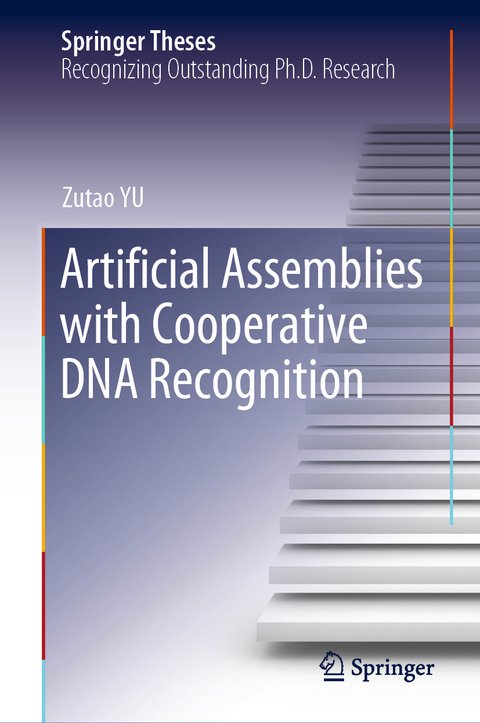
Artificial Assemblies with Cooperative DNA Recognition
Seiten
2020
|
1st ed. 2020
Springer Verlag, Singapore
978-981-15-4422-4 (ISBN)
Springer Verlag, Singapore
978-981-15-4422-4 (ISBN)
This book presents three types of synthetically cooperative DNA recognizing assemblies, in order to advance the development of programmable DNA-binding pyrrole–imidazole polyamides (PIPs). PIPs are characterized by their small molecular size, high binding affinity, programmability, sequence selectivity, and moderate cell permeability.
This book presents three types of synthetically cooperative DNA recognizing assemblies, in order to advance the development of programmable DNA-binding pyrrole–imidazole polyamides (PIPs).
PIPs represent the best-characterized class of small molecule DNA binders that can be modified to bind with any predetermined DNA sequence and regulate gene expression patterns in a transgene-free and cost-effective manner. PIPs are characterized by their small molecular size, high binding affinity, programmability, sequence selectivity, and moderate cell permeability. In recent years, there have been numerous novel studies on the applications of these biological tools; this research is thoroughly reviewed in the first chapter.
There are several critical issues, however, that impede the further broad study of PIPs, which greatly concern the author. For instance, the short PIP version has an excessively hi^10 bp; this significantly decreases cell permeability. Moreover, the conventional binding strategy for PIP design cannot apply to flexible DNA binding—for example, the DNA-binding mode of a transcription factor pair.
In this book, the author describes the development of three kinds of cooperative DNA-binding systems that help resolve the current highly problematic issues concerning PIPs. These three systems offer a range of significant advantages, such as favorable sequence selectivity, long recognition sequence, higher binding affinity, and a flexible gap distance.
Released at a critical juncture in the application of PIPs, this book will greatly facilitate their use as therapeutic drugs in the treatment of cancer and hereditary diseases, and in regenerative medicine.
This book presents three types of synthetically cooperative DNA recognizing assemblies, in order to advance the development of programmable DNA-binding pyrrole–imidazole polyamides (PIPs).
PIPs represent the best-characterized class of small molecule DNA binders that can be modified to bind with any predetermined DNA sequence and regulate gene expression patterns in a transgene-free and cost-effective manner. PIPs are characterized by their small molecular size, high binding affinity, programmability, sequence selectivity, and moderate cell permeability. In recent years, there have been numerous novel studies on the applications of these biological tools; this research is thoroughly reviewed in the first chapter.
There are several critical issues, however, that impede the further broad study of PIPs, which greatly concern the author. For instance, the short PIP version has an excessively hi^10 bp; this significantly decreases cell permeability. Moreover, the conventional binding strategy for PIP design cannot apply to flexible DNA binding—for example, the DNA-binding mode of a transcription factor pair.
In this book, the author describes the development of three kinds of cooperative DNA-binding systems that help resolve the current highly problematic issues concerning PIPs. These three systems offer a range of significant advantages, such as favorable sequence selectivity, long recognition sequence, higher binding affinity, and a flexible gap distance.
Released at a critical juncture in the application of PIPs, this book will greatly facilitate their use as therapeutic drugs in the treatment of cancer and hereditary diseases, and in regenerative medicine.
1. Synthetic transcription factors (Syn-TFs): design, progress and perspectives.- 2. Pip-HoGu, an artificial assembly with cooperative DNA recognition capable of mimicking transcription factor pairs.- 3. Orthogonal γPNA dimerization domains empower DNA binders with cooperativity and versatility mimicking that of the transcription factor pairs.- 4. Advanced DNA binding system mimicking the cooperative function of transcription factor pairs precisely recruits the epigenetic modifiers to the DNA repeat binding sites.
| Erscheinungsdatum | 15.05.2020 |
|---|---|
| Reihe/Serie | Springer Theses |
| Zusatzinfo | 119 Illustrations, color; 17 Illustrations, black and white; XV, 136 p. 136 illus., 119 illus. in color. |
| Verlagsort | Singapore |
| Sprache | englisch |
| Maße | 155 x 235 mm |
| Themenwelt | Naturwissenschaften ► Biologie ► Biochemie |
| Naturwissenschaften ► Biologie ► Genetik / Molekularbiologie | |
| Technik ► Umwelttechnik / Biotechnologie | |
| ISBN-10 | 981-15-4422-0 / 9811544220 |
| ISBN-13 | 978-981-15-4422-4 / 9789811544224 |
| Zustand | Neuware |
| Informationen gemäß Produktsicherheitsverordnung (GPSR) | |
| Haben Sie eine Frage zum Produkt? |
Mehr entdecken
aus dem Bereich
aus dem Bereich
Die Biochemie und industrielle Nutzung von Naturstoffen
Buch | Softcover (2024)
Springer Spektrum (Verlag)
49,99 €


